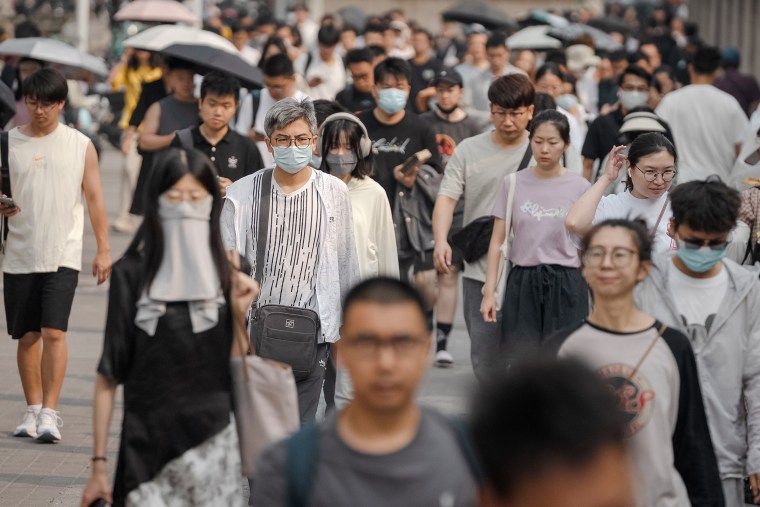HONG KONG — China said Friday it would raise its retirement age for the first time in decades, as the world’s second-largest economy struggles with falling birth rates and an aging workforce.
The country’s top legislative body approved a draft proposal to gradually implement the changes, state media reported Friday. China's retirement ages are among the lowest in the world and had remained unchanged since they were set in the 1950s.
The statutory retirement age for both men and women will be gradually increased starting Jan. 1 of next year, according to the decision by the Standing Committee of the National People’s Congress. Over a period of 15 years, it will be raised from 60 to 63 for men, 55 to 58 for women in white-collar jobs and 50 to 55 for women working in factories.
For those born in 1965, retirement would be delayed by one month, according to a chart published by Xinhua, China’s state-run news agency. Those born in 1984 would have to wait as long as five extra years to retire.
The changes have been the subject of heated discussion among the Chinese public since they were proposed earlier this year.
Young people already face intense competition to find jobs, while midcareer workers are being laid off as the Chinese economy recovers more slowly than expected after three years of pandemic isolation.
“So after 60, we still have to squeeze onto the bus with the young folks?” read one comment on Weibo, a popular Chinese social media platform. “Asking for time off for your 60th birthday? And if you die at your desk, would it count as a workplace injury?”
 Raising the retirement age would ease pressure on the pension system in China, where the population is aging and the workforce is shrinking.Na Bian / Bloomberg via Getty Images
Raising the retirement age would ease pressure on the pension system in China, where the population is aging and the workforce is shrinking.Na Bian / Bloomberg via Getty ImagesAnother sardonic comment read, “I’m really worried that when I’m 70 and go for an interview, my resume will be dozens of pages long, and HR might question why there was a gap when I was 25. But because of dementia, I won’t even be able to remember it!”
Raising the retirement age would ease pressure on the pension system at a time when local and provincial governments are facing massive budget deficits. Adding to the pressure is the fact that people are living longer in China, where life expectancy was 78 in 2021 compared with 51 in 1962, according to the World Bank.
By 2035, the number of people 60 and older in China will exceed 450 million, or 32.7% of the total population, according to the Economist Intelligence Unit.
The workforce needed to support the retirement-age population is also shrinking, with the number of births falling 10% in 2022 to their lowest level on record. Last year, China fell to the world’s second-most-populous country after India.
China’s decision to delay its retirement ages stems from a “really difficult” fiscal situation, said Alicia García-Herrero, chief economist for Asia-Pacific at Natixis in Hong Kong.
“Local governments simply don’t have the funds and pension payments are still decentralized,” she told NBC News.
But it will take time for the impact to be felt, García-Herrero said.
“China is starting late and from a very low level,” she said. “Even by 2040, the legal retirement age will still be low, comparatively, and still not gender-aligned.”
On Weibo, commenters lamented the country’s economic and demographic predicament.
“Young people can’t find jobs, and the elderly aren’t allowed to retire.”
Jennifer Jett and Peter Guo reported from Hong Kong, and Rae Wang from Beijing.
.png)
 6 days ago
14
6 days ago
14




























 Bengali (BD) ·
Bengali (BD) ·  English (US) ·
English (US) ·